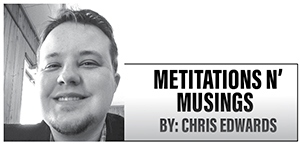A cup of digital detox is good for the soul
 By Chris Edwards
By Chris Edwards
This email address is being protected from spambots. You need JavaScript enabled to view it.
I recently did something that seems like an extreme aberration in 2022-going-on-’23: I unplugged from the world for a bit.
Yep. No emails, social media, phone, etc., etc. Robinson Crusoe of the 21st century right here.
Gentle readers, as a reporter and occasional op-ed scribbler for this website, you can probably imagine that there are a lot of places upon which my digital footprint is required.
Not checking Facebook or emails seems like an act of extreme rebellion these days, but sometimes a body just needs a break from it all.
As someone who feels largely out-of-place in the era of viral TikTok watercooler talk and seemingly every single retail transaction being predicated by a question of “do you have our app?”, the 24/7 connectedness only works to make my already considerable anxiety worse, and henceforth, exhausts me.
It’s also become disheartening to think that to many, I’m just a name on a screen, or a sobriquet on social media; more an idea than a person. At my core, I’m a low-tech kind of man, and I like it that way.
Don’t get me wrong, there are a lot of good things about being plugged-in. I am, as you might guestimate, a news junkie, so having 24/7 access to current information at my fingertips is a nice convenience to have, but not being able to get to sleep because I’m waiting around to see what sort of strange thing Marjorie Taylor Greene will tweet next or going down a rabbit hole of U.S. foreign policy, circa 2001, just to fill mental space is not doing anything good for me.
Sensory overload is very real, and the resulting fatigue is, as well. Being glued to one’s smartphone screen, just mindlessly scrolling, is a vampire of time. A recent study showed that about 61% of the people surveyed admitted that they are addicted to the internet and to their digital screens.
Worse yet, another study I came across unveiled that about 25% of smartphone users surveyed between the ages of 18 and 44 could not recall the last time their phone was not right next to them.
The problems of internet addiction can manifest in troubling psychological and resulting physiological ways. All of that time online can cause sleep problems (because, of course, scrolling through image galleries of orange cats until 2 a.m. is certainly conducive to sleep, right?); self-image problems and can add to depression and anxiety.
After a few days of being on my digital detox, I started to feel even more exhausted and stricken with migraine-level headaches. Withdrawal symptoms, I suppose. Not being plugged-in, however, it was nice to not hear a symphony of R2-D2-esque noises emitting from my phone at all hours of the day.
A recent headline on a CNN.com story stated that self-care is not a “luxury,” but a matter of survival. This is all-too-true, and something I’ve neglected for many years.
A constant overload on one’s senses takes a toll on quality of life, and taking a break from everything might be just what is needed for one’s mental and physical health. Sometimes one might even need to disconnect completely to be able to come back to living again.
You are a guest
or post as a guest
Be the first to comment.

